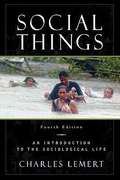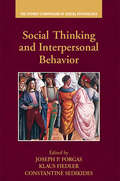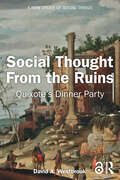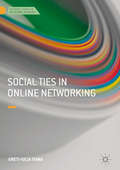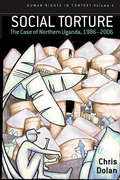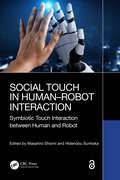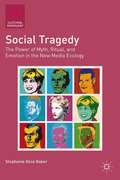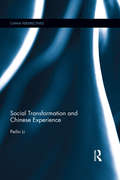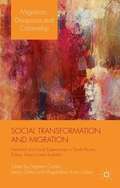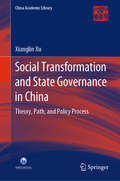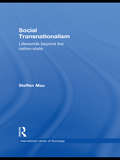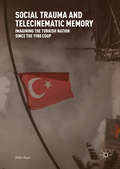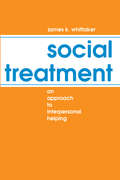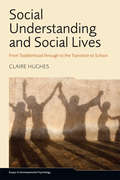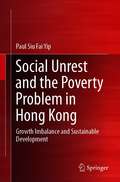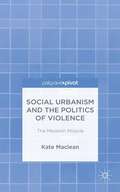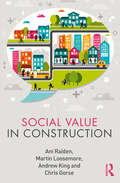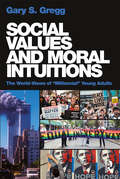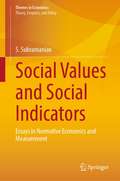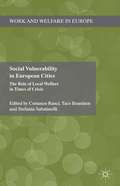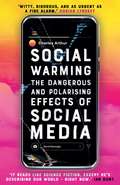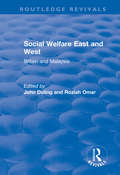- Table View
- List View
Social Things: An Introduction to the Sociological Life (4th edition)
by Charles C. LemertLemert (sociology, Wesleyan U.) describes his frustrations and accommodations to a life in sociology, along with the moments in which he and his discipline are one while examining the history of trends within sociology from the middle of the nineteenth to the last quarter of the twentieth, ending with the years in which he claims sociology discovered its "complicated vocation." Along with his pithy observations on why sociologists tended to think what and when, he is particularly acute in describing why globalization came at a time when it could only make poverty and deprivation, which were already on the rise, worse for more people, and what sociologists can do about the situation and still be human beings.
Social Thinking and Interpersonal Behavior (Sydney Symposium of Social Psychology)
by Klaus Fiedler Joseph P. Forgas Constantine SedikidesThe connection between mental and social life remains one of the most intriguing topics in all of psychology. This book reviews some of the most recent advances in research exploring the links between how people think and behave in interpersonal situations. The chapters represent a variety of theoretical orientations, ranging from evolutionary approaches through cognitive and affective theories, all the way to considering social and cultural influences on the relationship between social cognition and interpersonal behavior. Given its breadth of coverage, this volume is useful both as a basic reference book and as an informative textbook for advanced courses dealing with social cognition and interpersonal behavior. The main target audience comprises researchers, students, and professionals in all areas of the social and behavioral sciences, including social, cognitive, clinical, counseling, personality, organizational, forensic, and applied psychology, as well as sociology, communication studies, and social work. Written in a readable yet scholarly style, this volume serves as an engaging overview of the field for students in courses dealing with social cognition and social interaction at undergraduate and graduate levels.
Social Thought From the Ruins: Quixote’s Dinner Party (A New Order of Social Things)
by David A. WestbrookThrough stories, conversations, and essays, this book pursues interwoven critical and philosophical inquiries into the nature of the contemporary in the North Atlantic, asking how are we to live as intellectuals, individually and in community?Social Thought From the Ruins: Quixote’s Dinner Party is the product of informal discussion and academic work done over the last two decades among an international group of social scientists. An extended critique of academic life today and the context of our own thinking, this book interrogates aspects of our modernity, with its pervasive sense of crisis and uncertainty, and the difficulty of thinking clearly about things like the state and power, data and violence. Reflecting that the United States, indeed the North Atlantic countries, seem to have entered autumn, David A. Westbrook asks what spring might be. Will the critical social sciences have anything to offer the exercise of power, or are we doomed to incessant and ineffectual critique? Can bureaucracy be made at least more accountable, if not democratic? Conversely, can we feel less alienated from the structures of power that rule us, or that fail to govern at all? Can we feel at home?The Open Access version of this book, available at www.taylorfrancis.com, has been made available under a Creative Commons Attribution (CC-BY) 4.0 license.
Social Ties in Online Networking
by Greti-Iulia IvanaThis book explores the relevance of social networking from the perspective of its users to reveal the sociological significance of (inter)active experiences on Facebook. In doing so, the work examines obscure aspects of Facebook by addressing such questions as: What constitutes keeping in touch?; how is knowing of the other different from being with the other?; and why is the presence of others such an important element of Facebook? Social Ties in Online Networking discusses the significance of social networking activity through a collection of interviews with the users of Facebook. It analyses what they do, what they like and watch, but first and foremost how they intend their own actions and others' actions to be perceived within the realm of social media. This book is an exploration of relationships, which will be of interest to academics and students in sociology, social theory, human geography, social networking, media studies and social psychology.
Social Torture
by Chris DolanAs Director of the Refugee Law Project at the University of Makerere, Kampala, Uganda, Dolan offers a behind-the-scenes, cross-disciplinary study of one of Africa's longest running and most intractable conflicts. This book shows how, alongside the activities of the Lord's Resistance Army, government decisions and actions on the ground, consolidated by humanitarian interventions and silences, played a central role in creating a massive yet only very belatedly recognized humanitarian crisis. Not only individuals, but society as a whole, came to exhibit symptoms typical of torture, and the perpetrator-victim dichotomy became blurred. It is such phenomena, and the complex of social, political, economic and cultural dynamics which underpin them, which the author describes as social torture. Building on political economy, social anthropology, discourse analysis, international relations and psychoanalytic approaches to violence, this book offers an important analytical instrument for all those seeking entry points through which to address entrenched conflicts, whether from a conflict resolution, post-conflict recovery or transitional justice perspective.
Social Touch in Human–Robot Interaction: Symbiotic touch interaction between human and robot
by Masahiro Shiomi Hidenobu SumiokaIn this book for researchers and students, editors Shiomi and Sumioka bring together contributions from researchers working on the CREST project at ATR Deep Interaction Laboratories, a world leader in social robotics, to comprehensively describe robot touch systems from hardware to applications.Appropriate touch from robots to humans is essential for social robots, but achieving this requires various solutions at every stage of the touch process. Through this book, readers will gain an understanding of the needs, essential systems and communication cues, behaviour designs, and real‑world issues for social touch applications. This book compiles and updates technical and empirical research that was previously scattered throughout the literature into a single volume. Through individually authored chapters addressing various elements of ATR’s CREST project, this book tackles key areas where understanding is needed to realize acceptable touch interaction, including pre‑touch interaction, interaction design for touching and being touched, behaviour changes caused by touch interaction, and applications of social touch interaction. It introduces a touch sensor and robots developed by the authors, including several touch‑related behaviours and design policies. This approach will enable readers to easily apply this knowledge to their own social robotics programs. This book is invaluable for anyone who wishes to understand and develop social robots that physically interact with people.It is most beneficial for researchers and upper undergraduate and graduate students in the fields of human–robot/agent/computer interaction and social touch interaction and those in the broader fields of engineering, computer science, and cognitive science.
Social Tragedy
by Stephanie Alice BakerA social tragedy is a collective representation of injustice. Baker demonstrates how social tragedies facilitate moral action and discusses a series of contemporary case studies - the death of Princess Diana, Zin#65533;dine Zidane's 2006 World Cup scandal, KONY 2012 - to examine their social and political effects.
Social Transformation and Chinese Experience (China Perspectives)
by Peilin LiChina's success on economic growth and its exploration on political reform in the past few decades have attracted the attention from worldwide economic and political experts. This book studies China's transformation and experience from a sociological perspective, which broadens the research horizons and explores more complexity in contemporary China. This book examines China's social structural transformation, especially its implications on resource allocation and expounds on China's sociology academic history. In addition, it covers a broad range of issues including China's experience of reform and development, urbanization, social hierarchy change, social conflicts, social management, mass consumption, etc. Lastly, it investigates China's "urban village" as a byproduct of economic development and urbanization, which is rarely seen in other countries. These themes are key to understanding contemporary Chinese society, which makes this book a valuable reference for specialists on Chinese studies and those who are interested in contemporary China.
Social Transformation and Migration
by Stephen Castles Derya Ozkul Magdalena Arias CubasThis book examines theories and specific experiences of international migration and social transformation, with special reference to the effects of neo-liberal globalization on four societies with vastly different historical and cultural characteristics: South Korea, Australia, Turkey and Mexico.
Social Transformation and State Governance in China: Theory, Path, and Policy Process (China Academic Library)
by Xianglin XuThis volume is a selection of Chinese political scholar Xianglin Xu’s published works spanning nearly 20 years of research that explore and discuss the socio-economic transition in China under state political reform. Contextualized within the decades following the 80s, the author analyzes patterns observed from empirical studies, and breaks down the underlining reasoning, conditions and functionalities behind the incremental reform policies pushed forward by the Party and government.The collection is broken up into four sections: the first provides a general framework and theoretical / historical introduction to social transition research in the case of China; the second section discusses the underpinning logic behind political reform in China and practical concerns; the third section follows with discussions on reform policy practices within China including application and trajectory; the final section concludes with an analysis of reform within state institutional infrastructure and policy innovation.
Social Transformations in India, Myanmar, and Thailand: Social, Political and Ecological Perspectives
by Makiko Takeda Chosein Yamahata Donald M. Seekins“This book focuses on the different challenges and opportunities for social transformation in India, Myanmar and Thailand, by centering communities and individuals as the main drivers of change. In doing so, it includes discussions on a wide array of issues including women’s empowerment and political participation, ethno-religious tensions, plurilingualism, education reform, community-based healthcare, climate change, disaster management, ecological systems, and vulnerability reduction. Two core foundations are introduced for ensuring broader transformations. The first is the academic diplomacy project – a framework for an engaged academic enquiry focusing on causative, curative, transformative, and promotive factors. The second is a community driven collective struggle that serves as a grassroots possibility to facilitate positive social transformation by using locally available resources and enabling the participation of the resident population. As a whole, the book conveys the importance of a diversification of engagement at the grassroots level to strengthen the capacity of individuals as decisive stakeholders, where the process of social transformation makes communities more interconnected, interdependent, multicultural and vital in building an inclusive society.”
Social Transnationalism: Lifeworlds Beyond The Nation-State (International Library of Sociology)
by Steffen MauIn recent decades, the rise of world markets and the technological revolutions in transportation and communication have brought what was once distant and inaccessible within easy reach of the individual. The territorial and social closure that characterized nation-states is fading, and this is reflected not only in new forms of governance and economic globalization, but also in individual mobility and transnational transactions, affiliations and networks. Social Transnationalism explores new forms of cross-border interactions and mobility which have expanded across physical space by looking at the individual level. It asks whether we are dealing with unbridled movements and cross-border interactions which transform the lifeworlds of individuals fundamentally. Furthermore, it investigates whether, and to what degree, increases in the volume of transnational interactions weaken the individual citizen's bond to the nation-state as such, and to what extent citizens' national identities are being replaced or complemented by cosmopolitan ones
Social Trauma and Telecinematic Memory
by Pelin BaşcıThis book explores responses to authoritarianism in Turkish society through popular culture by examining feature films and television serials produced between 1980 and 2010 about the 1980 coup. Envisioned as an interdisciplinary study in cultural studies rather than a disciplinary work on cinema, the book advocates for an understanding of popular culture in discerning emerging narratives of nationhood. Through feature films and television serials directly dealing with the coup of 1980, the book exposes tropes and discursive continuities such as "childhood" and "the child". It argues that these conventional tropes enable popular debates on the modern nation's history and its myths of identity.
Social Treatment: An Approach to Interpersonal Helping (Modern Applications Of Social Work Ser.)
by James K. WhittakerThe book has two principal purposes: To provide an introduction to interpersonal helping in the context of social work practice, and to develop a conceptual framework for interpersonal helping --called social treatment--that will enable the social worker and members of other helping professions effectively to use all the various methods and strategies currently practiced. The book offers an orderly and systematic way of proceeding through a complex and often confused area of practice; in it, large issues--such as remediation versus prevention--are explored along with concrete suggestions for intervention with individuals, families, and small groups.Theoretical systems are considered not merely for the techniques they suggest but also for the values and views of man inherent in them. The helping process itself is analyzed from the point of view of the consumer as well as the worker. A conceptual framework for practice is developed that allows for systematic eclecticism in theory and technique, providing a framework for evaluating and comparing different methods of social treatment. The author defines social treatment as "an approach to interpersonal helping which utilizes direct and indirect strategies of intervention to aid individuals, families, and small groups in improving social functioning and coping with social problems."Beginning with a discussion of the concept of remediation within the context of the larger contemporary issues of social reform and environmental protection, Professor Whittaker proceeds to consider several critical issues in present social work practice, such as client advocacy, service delivery systems, and professionalization. Subsequent chapters discuss the multiple roles that social work practitioners perform, the major theoretical bases of social treatment, the treatment sequence from intake to after care, and the full range of helping activities that practitioners undertake indirectly on behalf of their clients. The fin
Social Trends in American Life: Findings from the General Social Survey since 1972
by Peter V. MarsdenChanges in American social attitudes and behaviors since the 1970sSocial Trends in American Life assembles a team of leading researchers to provide unparalleled insight into how American social attitudes and behaviors have changed since the 1970s. Drawing on the General Social Survey—a social science project that has tracked demographic and attitudinal trends in the United States since 1972—it offers a window into diverse facets of American life, from intergroup relations to political views and orientations, social affiliations, and perceived well-being.Among the book's many important findings are the greater willingness of ordinary Americans to accord rights of free expression to unpopular groups, to endorse formal racial equality, and to accept nontraditional roles for women in the workplace, politics, and the family. Some, but not all, signs indicate that political conservatism has grown, while a few suggest that Republicans and Democrats are more polarized. Some forms of social connectedness such as neighboring have declined, as has confidence in government, while participation in organized religion has softened. Despite rising standards of living, American happiness levels have changed little, though financial and employment insecurity has risen over three decades.Social Trends in American Life provides an invaluable perspective on how Americans view their lives and their society, and on how these views have changed over the last two generations.
Social Understanding and Social Lives: From Toddlerhood through to the Transition to School (Essays in Developmental Psychology)
by Claire HughesWinner of the British Psychological Society Book Award (Academic Monograph category) 2013! Over the past thirty years, researchers have documented a remarkable growth in children’s social understanding between toddlerhood and the early school years. However, it is still unclear why some children’s awareness of others' thoughts and feelings lags so far behind that of their peers. Based on research that spans an extended developmental period, this book examines this question from both social and cognitive perspectives, and investigates the real-life significance of individual differences in theory of mind. After tracing the key age-related changes in the development of theory of mind, this book examines individual differences in relation to children’s cognitive abilities and their social experiences. Why might language or executive function matter for children’s social understanding? And how do children’s linguistic environments and relationships with parents and siblings contribute to their ability to reflect on people’s thoughts and feelings? The book also reviews the evidence for predictive links between early social understanding and later social behaviour. Using information gathered from classmates, teachers and the children themselves, the author investigates links between individual differences in early social understanding and in the quality of children’s interactions with friends, in their ability to resolve conflict, and in diverse aspects of school adjustment. Drawing on rich observational data gathered in this extended longitudinal study, as well as skills acquired during her early experimental studies of children with autism and a six year collaboration with Professor Judy Dunn, the author integrates both cognitive and social accounts of theory of mind. The book is ideal reading for researchers actively working in the field, graduate and undergraduate students specializing in developmental psychology, educational and health professionals, and parents interested in learning about children’s early social development.
Social Unrest and the Poverty Problem in Hong Kong: Growth Imbalance and Sustainable Development
by Paul Siu YipThis book discusses the policy and public health challenges in Hong Kong from the perspective of economic and social welfare challenges, specifically focusing on the poverty and inequality research supported by the Hong Kong Jockey Club (HKJC) Charities Trust. Conducted by Prof Yip and his research team at the HKJC’s Centre for Suicide Research and Prevention at the University of Hong Kong across a five-year period, the book presents analyses based on high quality statistical data to explore some of the socioeconomic roots of the civil unrest in 2019, while also acknowledging the limitations and challenges of trying to build a stronger society under the constraints of the One Country Two Systems policy. Building on extensive research done by the research team and some governmental data, it provides concrete, evidence-based suggestions for reducing poverty in a high-income society, which are useful not only for Hong Kong but also for other societies experiencing similar challenges. It makes an original contribution to research into inequalities, poverty and social policies, and will be of interest to those seeking to understand the ongoing political challenges in Hong Kong and how they relate to the socioeconomic challenges and policies that affect the everyday lives of ordinary people there. It is relevant to academics, students and policymakers concerned with social inequalities and policy intervention.
Social Urbanism and the Politics of Violence: The Medellín Miracle
by Kate MacleanMedellin, Colombia, used to be the most violent city on earth, but in recent years, allegedly thanks to its 'social urbanism' approach to regeneration, it has experienced a sharp decline in violence. The author explores the politics behind this decline and the complex transformations in terms of urban development policies in Medellin. "
Social Value in Construction
by Andrew King Chris Gorse Martin Loosemore Ani RaidenWhile the concept of social value is not new, recent interest in social value in construction has grown because of new social procurement legislation around the world and an increasing acceptance of the need to ensure construction projects provide social value, rather than simply economic value. Despite this growing recognition, literature and professional guidance on the subject is hard to find. This is the first book looking at social value in construction and it sets the agenda by asking and answering important questions like: How is the construction industry developing and supporting social enterprise and social value and for who? How and when is the industry recording and measuring social value and its effect? Which organisations are doing things well and what can we learn from their experiences? What can industry players do together to consolidate efforts and drive improvements? What are the key challenges in the field and what does the future look like? Drawing on a variety of professional and academic experiences and disciplines, the authors present global perspectives and lay the foundations for creating social value in the construction industry. This timely book makes use of real-life case studies and examples of best practice to demonstrate how innovative companies can utilise contemporary research to create social value through their projects. It is time the construction industry viewed community involvement and corporate social responsibility as an opportunity rather than a risk, and this is the book that shows the industry how. This is essential reading for all professionals in the construction, engineering, architecture and built environment sector. In particular, project managers, clients, contract managers, quantity surveyors, CSR and HR personnel will gain a lot from reading this book.
Social Values and Moral Intuitions: The World-Views of "Millennial" Young Adults
by Gary S. GreggMillennials have been stereotyped as both "entitled slackers" and "the next greatest generation." This study uses depth interviews to offer a scholarly and balanced account of young adults’ values and world-views. It investigates their views on a wide range of issues, including religion, the economy, politics, gender, ethnicity, and the digital technologies they’ve grown up with. Based on the findings, it revises current theories about the psychological underpinnings of beliefs, especially about the "moral intuitions" that guide Millennials’ thinking. Examining the values they share and the distinctive views of individuals, this fascinating work will interest researchers and students in psychology and related social sciences.
Social Values and Poetic Acts: The Historical Judgment of Literary Work
by Jerome McgannLiterary Criticism
Social Values and Social Indicators: Essays in Normative Economics and Measurement (Themes in Economics)
by S. SubramanianThe book is a collection of essays written since 2010, and dealing, in one way or another, with the place of values in economic analysis. The centrality of values in the collection is not surprising, given that the thematic concerns informing the essays in the book relate principally to methodological issues in economic enquiry, to the normatively constrained aggregation of personal preferences into collective choice, and to problems of logical coherence and ethical appeal in the axiom systems underlying the measurement of economic and social phenomena such as poverty, inequality and literacy. While many of the essays are more or less technical in nature, they are all explicitly motivated by considerations that go beyond the formalisms of presentation to an involvement with the role of moral reasoning in economic analysis. In particular, the essays emphasize the importance of ‘ought propositions’ in a science which is all too often regarded as being wholly and exclusively ‘positive’ in its orientation. The book should be of particular interest to researchers, students, and public policy makers.
Social Vulnerability in European Cities
by Costanzo Ranci Taco Brandsen Stefania SabatinelliWhat has been the impact on social cohesion of contemporary cities in Europe, of the rise of new social risks and of the recent economic crisis? Focussing on 20 European urban contexts, this book provides an empirical analysis of the socio-economic transformations driving the emergence of new social risks and of the capacity of welfare policies.
Social Warming: The Dangerous and Polarising Effects of Social Media
by Charles ArthurNobody meant for this to happen. Facebook didn&’t mean to facilitate a genocide. Twitter didn&’t want to be used to harass women. YouTube never planned to radicalise young men. But with billions of users, these platforms need only tweak their algorithms to generate more &‘engagement&’. In so doing, they bring unrest to previously settled communities and erode our relationships. Social warming has happened gradually – as a by-product of our preposterously convenient digital existence. But the gradual deterioration of our attitudes and behaviour on- and offline – this vicious cycle of anger and outrage – is real. And it can be corrected. Here&’s how.
Social Welfare East and West: Britain and Malaysia (Routledge Revivals)
by John Doling Roziah OmarThis title was first published in 2000: An exploration of the ways in which social welfare in two countries, half a world apart, may have similarities. Through identification of the differences and similarities of social welfare in Britain and Malaysia, the editors hope that we may be able to learn from one another as well as to contribute to debates both in our countries about how to respond to globalization and about global social policy. Accordingly, the contributors arranged themselves into pairs - one Malaysian, one British - to write reviews of one of each of the six areas of social welfare. Along with an opening chapter in which the aim was to identify a number of frameworks and issues that would allow the rest to be put into a context, the 12 chapters, each restricted to around 5000 words, provide a service-by-service account.
